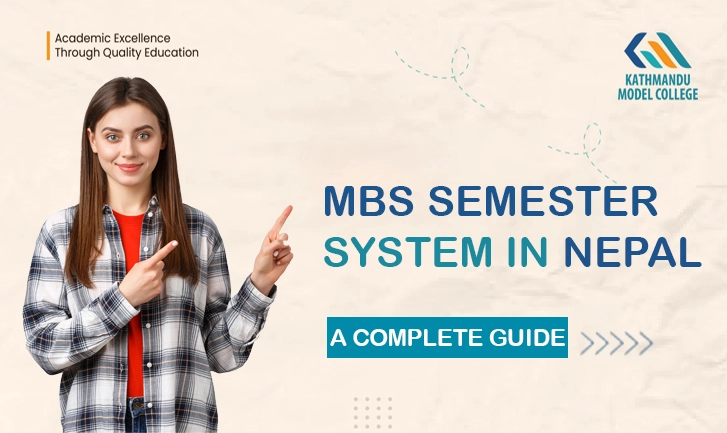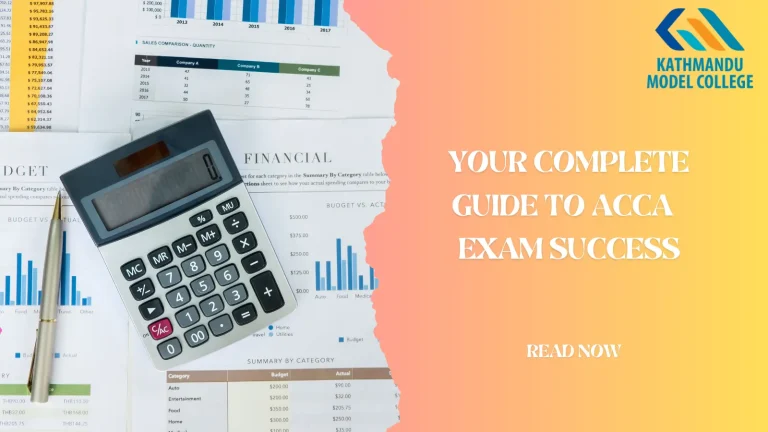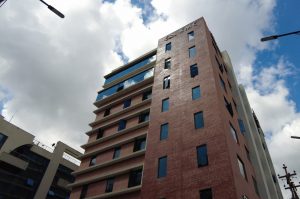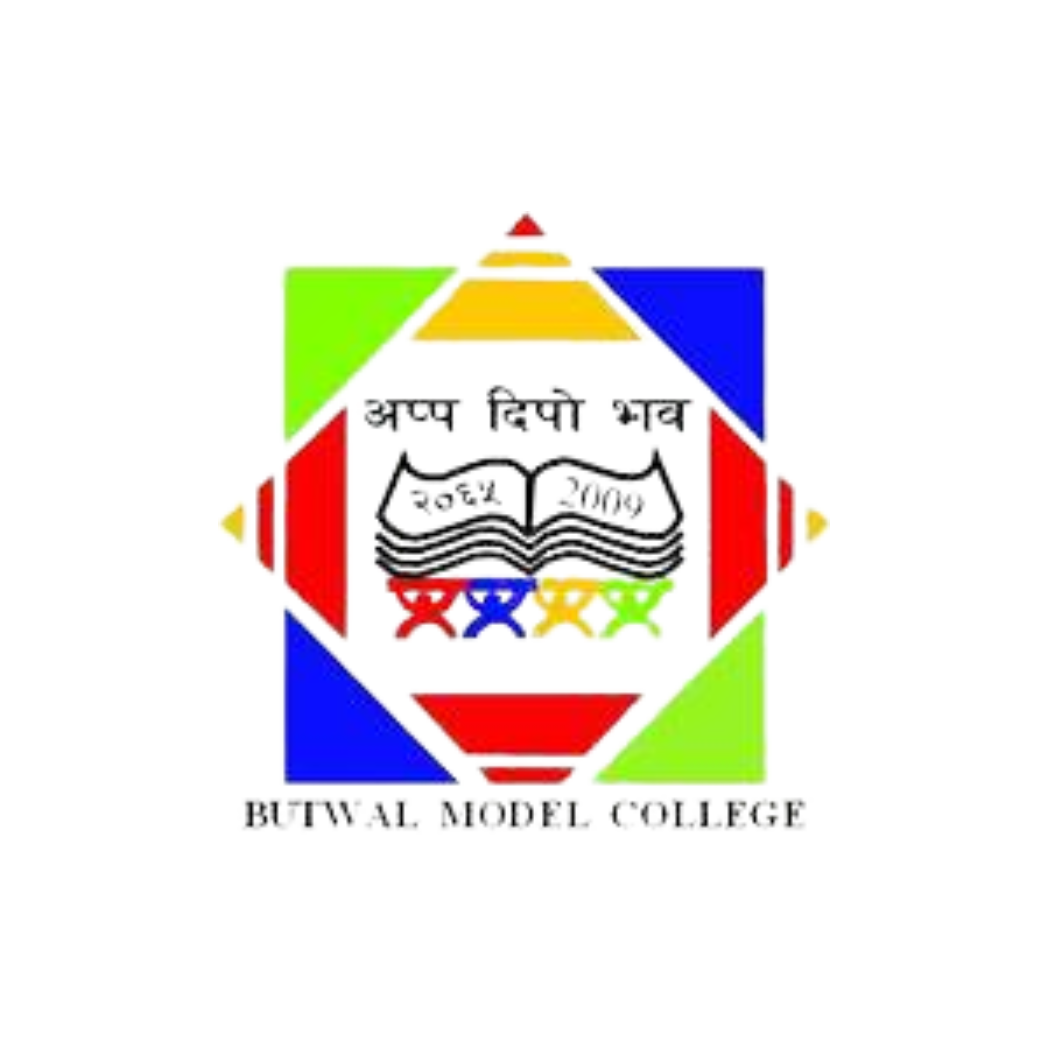
MBS Semester System In Nepal: Guide To Successful Career
Selecting a major or college isn’t the only factor in selecting the best college. It’s about finding the learning environment that suits you and the pace that supports your success. Here at Kathmandu Model College, we proudly excel at the semester system. So, what do you mean by semester system?
The semester system splits the academic year into two halves. Six months make up a semester. So, the two year MBS at KMC consists of four semesters. Students must regularly participate in class and be present on time. The minimum attendance requirement must be met to be eligible to appear in the final examination.

Why Semester System?
MBS semester structure is important for raising learners’ academic performance. It is beneficial to use modern technologies to replace traditional teaching and learning methods and to adhere to international standards for postgraduate study.
Using the semester approach, KMC can successfully develop human resources through academic achievements.
Benefits Of The MBS Semester System In Nepal
- MBS semester system in KMC provides twice-yearly assessment of student’s performance.
- Students will have a semester break after final exams of every semester.
- They will have the opportunity to get continuous guidance, evaluation, and feedback.
- There will be more interaction between lecturers and students in semester system.
- Students enrolled in this system regularly attend the college due to the mandatory 80% attendance policy.
- MBS semester system provides students with a better way of developing skills and subject-related information.
MBS Semester System vs. Annual system
Students will be able to study more courses under the semester system than under the annual system. Students switch to a new subject every six months, replacing their previous one. MBS semester system is more expensive than the traditional annual system.
They will receive constant feedback through the semester system because exams are given at the end of every semester.
So, students keep up their daily preparation. Under the annual system, students usually begin their exam preparation at the last moment MBS semester system is considered to be more motivating and effective than the annual system.
Former students had to wait a full year, thus there was no learning need or incentive; in contrast, the latter kept students involved and proactive.
Semester Evaluations
In-semester Evaluations
The internal evaluation will have a total weight of 40% for each course. Students have to secure at least 50 percent marks in each subject to pass the in-semester exam. The in-semester evaluation shall be based on a student’s performance in class presentations, case analysis, project assignments, class tests, and others as required by the course. A student must secure a minimum Grade Point Average (GPA) of 2.7 or Grade B minus (B-) in a course in order to be eligible to appear in the semester-end examination of that course.
In-semester evaluation: 40 Marks
Evaluation Activities Weight in % |
In-semester pre-board examination 40 |
Class-room activities (Class presentations, 20 case analysis, group works etc) |
Project Assignments 30 |
Class Attendance 10 |
Total 100%
Semester-end Examinations
The semester-end examinations on course work related subjects shall have a total weight of 60 percent. The semester-end examination shall be based on problem solving questions, analytical questions, case studies, or any other formats as demanded by a course. The duration of the examination will be 3 hours for each course.
External Evaluation: 60 Marks
Evaluation Components | Number of Questions and Weight in % Choice |
Case Analysis, Situation Analysis or Extended Problem Analysis as suitable to the course. | Two Compulsory Questions 50 |
Problem Solving, Critical Analysis Oriented questions | Three analytical Questions 30 with one choice. (Two questions of 15 marks each to be solved by students) |
Concept Oriented Short Answer Questions | Six Short Answer Questions 20 with Two Choice Questions (Four Questions of 5 marks to be solved by Students) |
Total marks 100 |
Grading System
The grading system followed in the MBS program will be based on the absolute performance of a student in the in-semester evaluations and semester-end examinations.
The performance of a student in the MBS program shall be made on a four point scale ranging from 0 to 4. The passing grade in the semester-end examination for an individual paper shall be grade “B minus” or GPA of 2.7.
In order to pass the semester examination the student must secure a minimum of Grade “B” or Cumulative Grade Point Average (CGPA) of 3.0 (60 percent). The
overall grade of a student will be determined by the student’s performance in the in-semester and semester-end examinations.
The following table presents the Letter Grade, GPA, percentage equivalent and Performance Remarks for the MBS program: Grade GPA Percentage Equivalent Performance Remarks A 4.0 90 and above Excellent A- 3.7 80 -89.9 Very good B+ 3.3 70 -79.9 First Division B 3.0 60 – 69.9 Second Division B- 2.7 55 – 59.9 Pass in individual course F 0 below 55 Fail
Normal and Maximum Duration of Study
The following are the maximum times to finish the program’s requirements: Normal duration 24 months (4 semesters) Maximum duration 5 Years
Failing In Course
Students must reregister and repeat the course in accordance with the semester cycle if they are not eligible to appear in the final exams. Students who meet the requirements but either do not show up for the semester-end exams or do not pass them may take makeup exams.
Students can take part in exams for a maximum of two courses in such a scenario. FOM shall organize chance make-up examinations in the last semester only where a student may appear in two courses of the earlier three semesters.
Credit Transfer And Withdrawal
- The program allows students to transfer the credits earned by them in similar program of other universities as recognized by TU.
- Applicants must apply at the FOM and pay a fee for each credit that they would like to transfer from an authorized university or college that has been recognized by TU. ● An approved institution or college will allow students to transfer up to fifteen to twenty credit hours in total.
- Concerned academic staff or the institution will examine all prior college or university transcripts to ascertain which credits might be transferable.
- FOM will review every course taken by a student to another university/college. ● The student should earn at least 50% of credit hours in the master program to be eligible for credit transfer.
Strategies For Thriving In A Semester System
- Time management: A strategy for prioritizing your time is just as important as one for remembering deadlines and significant dates, regardless of whether you use an electronic device or a traditional planner or calendar.
- Use KMC resources: Remember the library! The reference librarians in particular will be of great help to you in finding the information or resources you need. Additionally, there is usually an academic help center with training on study skills (such as note-taking, study skills, etc.). Use the counseling center’s resources if you’re feeling overburdened, either emotionally or physically.
- Active learning: Do more than just read and listen passively. Ask questions, participate in discussions, make notes, and apply ideas to real-life situations.
Frequently Asked Questions
The semester system splits the academic year into two halves. Six months make up a semester.
There are four semesters in MBS course.
The performance of a student in the MBS program shall be made on a four point scale ranging from 0 to 4. The passing grade in the semester-end examination for an individual paper shall be grade “B minus” or GPA of 2.7
Applicants must apply at the FOM and pay a fee for each credit that they would like to transfer from an authorized university or college that has been recognized by TU.
Students must reregister and repeat the course in accordance with the semester cycle if they are not eligible to appear in the final exams








































